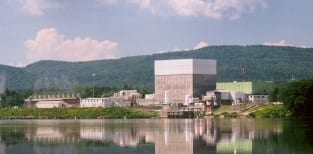ISO New England issues statement on the regional impacts of Vermont Yankee retirement
 On Tuesday, August 27, Entergy Nuclear Power Marketing submitted to ISO New England its formal request to retire the Vermont Yankee Nuclear Power Station in 2014. ISO New England issued the following statement on the impacts this decision will have on the New England power system:
On Tuesday, August 27, Entergy Nuclear Power Marketing submitted to ISO New England its formal request to retire the Vermont Yankee Nuclear Power Station in 2014. ISO New England issued the following statement on the impacts this decision will have on the New England power system:
ISO New England has studied the needs of the high-voltage power system serving Vermont and New Hampshire for more than four years, including analyses of scenarios with and without Vermont Yankee in service. While earlier studies showed that reliability could be affected without Vermont Yankee, the most recent study in 2012 showed that the regional power grid could be operated reliably without Vermont Yankee. This was due to new system conditions including the development of some new resources acquired through the region’s capacity market; completion of some previously planned transmission upgrades; and the demand-reducing effects of energy-efficiency measures. With Entergy’s formal request to retire Vermont Yankee, this study will be updated.
Regardless of the outcome of these studies, the ISO does not have the authority to prevent a resource from retiring. With a maximum capacity of more than 600 megawatts, Vermont Yankee is among the region’s largest power plants and is one of four nuclear stations providing baseload power to New England. Overall, nuclear generation produced 31% of New England’s electricity in 2012.
Although the ISO, as the administrator of the region’s wholesale electricity markets, does not favor any fuel or technology, the retirement of this large nuclear station will result in less fuel diversity and greater dependence on natural gas as a fuel for power generation. The ISO has identified New England’s dependence on natural gas for power generation and the potential retirement of generators as key strategic risks, and is developing solutions to address these and other strategic challenges.
Natural gas generated more than 52% of the energy produced in New England last year, and the price of natural gas has declined significantly in New England with increasing production of natural gas from the Marcellus shale in New York and Pennsylvania. With falling natural gas prices, wholesale electricity prices in New England fell in 2012 by nearly 23%, to their lowest levels since 2003, when markets in their current form were launched.
Lower natural gas prices have resulted in lower electricity prices and less revenue for resources in the energy market, while excess supply has dampened prices in the capacity market. These fundamental economic dynamics demonstrate that these markets are competitive. While lower prices are beneficial for consumers, resource owners must base their business decisions on whether to continue to compete based on their specific circumstances.
These economic forces are pushing other older, fossil-fuel-fired generators toward retirement, which will only increase the region’s dependence on natural gas. The ISO is working with market participants and the New England states to develop potential market enhancements, including a pay-for-performance market mechanism that will create strong financial incentives for generators to assure that they have adequate fuel arrangements to be able to produce electricity when called on by the ISO.
- Categories
- Inside ISO New England
- Tags
- generator retirement, natural gas, new england states, nuclear energy
